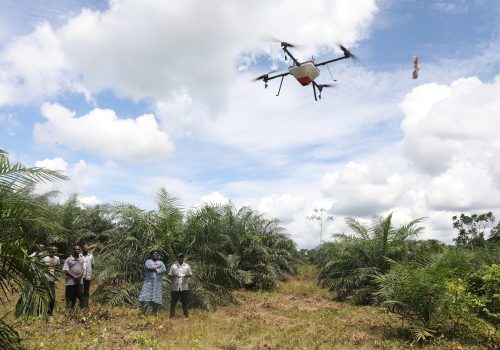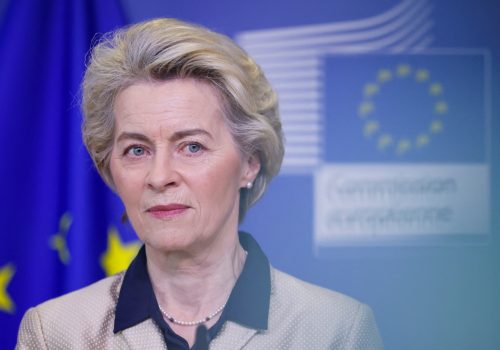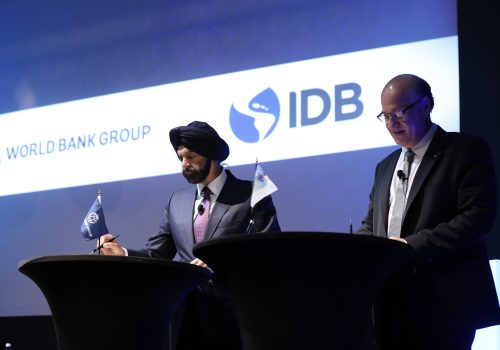Does the new Partnership for Atlantic Cooperation mark a sea change in transatlantic relations?
It’s a whole-of-Atlantic strategy. On the sidelines of the United Nations General Assembly (UNGA) on Monday, the White House announced the creation of the “Partnership for Atlantic Cooperation.” The Partnership, which includes thirty-two countries bordering the Atlantic Ocean from Europe, Africa, and the Americas, aims to further collaboration on economic development, environmental protection, and maritime issues such as illegal fishing. What are the pact’s implications for US engagement with the Global South, north-south Atlantic relations, and the threats to the Atlantic Ocean posed by climate change? Below, our experts wade into the Partnership’s purpose and its potential to reshape transatlantic relations.
Click to jump to an expert analysis:
Matthew Kroenig: Planting the seeds for more US engagement with the Global South
Rama Yade: An innovative way for the US to engage with African countries—and not just on challenges
Christopher Skaluba: A step toward a more inclusive liberal world order
Christian Bjørn Følsgaard: Could the Partnership become a Belt and Road alternative?
Planting the seeds for more US engagement with the Global South
In the early stages of the last Cold War, the United States created the North Atlantic Treaty Organization to counter the Soviet Union. In the early stages of this new Cold War, the United States needs to create a new south Atlantic partnership to counter the growing influence of Russia and China in the Global South. The announcement of a new Partnership for Atlantic Cooperation is a step in that direction, bringing together the United States and Europe alongside partner countries in the Global South, including the south Atlantic community. It’s a modest first step focused on noncontroversial issues such as climate, ocean sustainability, and the like. This narrow scope was necessary to get some important swing states such as Brazil on board, but let’s hope that it plants the seed for more robust future engagement as the United States seeks to win over the Global South away from the revisionist autocracies and toward the free world.
—Matthew Kroenig is vice president and senior director of the Atlantic Council’s Scowcroft Center for Strategy and Security and the Council’s director of studies.
An innovative way for the US to engage with African countries—and not just on challenges
Almost half (fifteen) of the thirty-two Atlantic countries that launched the new Partnership for Atlantic Cooperation this week are African: Angola, Cabo Verde, Côte d’Ivoire, Equatorial Guinea, Gabon, The Gambia, Ghana, Guinea, Liberia, Mauritania, Morocco, Nigeria, the Republic of the Congo, Senegal, and Togo. Some have noticed that a several of the twenty-three total Atlantic African countries, including South Africa and the Democratic Republic of the Congo, have not been included.
This initiative is certainly one of the most innovative angles through which the United States can engage with countries on the African continent and bring their shared interests together. Because the Atlantic is the second-largest of the world’s oceans and has always played a geopolitical role, the United States knows how much it can leverage mutual interests that neither Russia nor China can use.
Beyond the obvious topics of work (climate, sciences, technology), the inclusion of illegal fishing kills two birds with one stone by countering Chinese practices and bringing solutions to West African countries concerned by difficult access to the seafood so critical to African food security. In a recent report, the Environmental Justice Foundation noticed that “China’s distant water fleet—by far the world’s largest—is rife with human rights abuses and illegal fishing,” adding that “in West Africa, an area known to be rife with illegal fishing, the Chinese bottom trawl fleet catches an estimated 2.35 million tons of seafood every year—by some estimates, around half of China’s total distant-water catch—valued at over five billion dollars. Many fish populations in Africa are heavily exploited, to the point of possible collapse, which would spell disaster for impoverished coastal communities.”
The fight against piracy is also a way to contain the jihadist movements coming from the Sahel, as well as South American drug dealers. Senegalese President Macky Sall recently recalled the old jihadist plan to build an arc from the Red Sea to the Atlantic coast. “Their goal is to reach the Atlantic Ocean,” he said, mentioning the new targeted attacks on the Gulf of Guinea, from Cote d’Ivoire to Togo. The Gulf of Guinea, where every day more than four thousand ships pass through, is also one of the most dangerous in the world because of piracy and banditry. Tons of cocaine are regularly seized in the Gulf of Guinea from South American vessels. Connections have been found between South American drug traffickers and Sahelian terrorist networks.
But the Partnership for Atlantic Cooperation should not limit its work to these challenges. The Atlantic can also be an opportunity when it comes to ports cooperation, smart ports’ deployment, tourism, the inclusion of diasporas, and even culture through a cooperation between coastal museums that continue to carry the memory of the transatlantic slave trade, from Gorée Island in Senegal to the new International African American Museum in Charleston, South Carolina, not to mention the Memorial to the Abolition of Slavery in Nantes, France.
—Rama Yade is the senior director of the Atlantic Council’s Africa Center and senior fellow for the Europe Center.
A step toward a more inclusive liberal world order
A key concern around Russia’s war in Ukraine is about the sympathies of the “Global South,” which, from a US and European perspective, is sometimes seen as ambivalent about the conflict, if not outright supportive of Russia. While the reality is more nuanced, the fact of the matter is that China and Russia have much more influence in the southern hemisphere than Washington and Brussels would like. Enter the Partnership for Atlantic Cooperation, a creative, low-cost way to engage Africa, South America, and the Caribbean in an altogether new format.
That it is altogether new is important. Rather than try to forge partnerships with existing institutions such as the European Union or NATO, which can be viewed skeptically by outsiders as instruments of Western dominance, the Partnership for Atlantic Cooperation is ostensibly a chance for participating countries to build a new “Atlanticist” institution together. It is an opportunity to tangibly adapt the “liberal world order” into something more inclusive—a perennial talking point among Western officials where action has been scarce.
In the game of geopolitical poker where the BRICS grouping (currently Brazil, Russia, India, China, and South Africa) is expanding and strategic competition between the United States and China intensifies, there is a new card on the table. How that card is played—whether attention and resources are dedicated to building it—will ultimately define its effectiveness more than the fact of its existence. But it is a promising starting point.
—Christopher Skaluba leads the Transatlantic Security Initiative in the Scowcroft Center for Strategy and Security.
Could the Partnership become a Belt and Road alternative?
The formal creation of the Partnership is a welcome first step toward a more proactive approach to US-led diplomacy throughout the north and south Atlantic. Underscoring a fundamental shift, US policymakers have come to realize their reliance on global cooperation to counter China’s increasing control of global supply chains. The United States and its Western allies therefore appear to have answered the Atlantic community’s call by joining rather than leading the conversation on how best to reshape the extant rules-based international system in addressing the needs of the Global South.
The Partnership announcement makes a number of bold proclamations regarding its goals, from confronting climate change to combating illicit activities committed across the Atlantic Ocean. The declaration is most noteworthy for its specific references to “uphold the principles of sovereign equality, territorial integrity, and political independence of states.” This passage is a rather thinly veiled reference to the perceived corrosive effects of China’s Belt and Road Initiative (BRI) across Africa and South America, as well as UNGA’s overarching theme this year of safeguarding territorial integrity in response to Russia’s full-scale invasion of Ukraine in 2022.
Several questions remain regarding both the intent and prospects of this new forum: Will the Partnership’s future be primarily restricted to a maritime association focused on climate change and the unimpeded flow of goods across the Atlantic, or can its purpose grow greater in scope and ambition, possibly as a viable alternative to China’s BRI throughout the region?
—Christian Bjørn Følsgaard is a senior advisor to the Atlantic Council’s Scowcroft Strategy Initiative within the Scowcroft Center for Strategy and Security.
Further reading
Tue, Sep 19, 2023
Unlocking Africa’s agricultural potential
Issue Brief By
The ongoing digital revolution in Africa presents a valuable opportunity to revolutionize the continent’s food systems.
Thu, Aug 3, 2023
Four big geopolitical tests the European Union faces this year
New Atlanticist By Jörn Fleck, James Batchik
From Ukraine to artificial intelligence, the second half of 2023 poses major tests that will reveal the realities of the EU’s geopolitical aspirations.
Sat, Sep 2, 2023
Why the Inter-American Development Bank-World Bank deal matters, and what’s next
New Atlanticist By
Presidents Ilan Goldfajn and Ajay Banga signed a landmark agreement on August 31 to address development in Latin America and the Caribbean.
Image: US Secretary of State Antony Blinken delivers remarks during the Ministerial Meeting on Atlantic Cooperation, Monday, Sept. 18, 2023, in New York, U.S. Craig Ruttle/Pool via REUTERS


